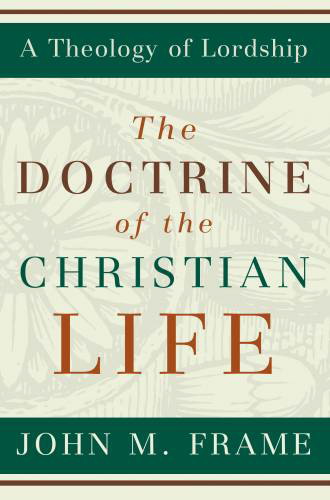
John M. Frame
Reviewed by: Tony Monaghan
The Doctrine of the Christian Life, by John M. Frame. Published by P&R Publishing, 2008. Hardback, 1,104 pages, list price $44.99. Reviewed by OP pastor Tony Monaghan.
Stretching past eleven hundred pages, John Frame's The Doctrine of the Christian Life is not light reading. The book is the third in Frame's Lordship Series, following after The Doctrine of the Knowledge of God and The Doctrine of God. In each of these works, Frame, who teaches systematic theology at Reformed Theological Seminary in Orlando, Florida, brings a triperspectival analysis to bear on theology and life. The three perspectives are: the normative perspective (the biblical rules that govern behavior), the situational perspective (the culture in which we live), and the existential perspective (our own experience, particularly as the redeemed). In this volume, ethics receives that analysis.
The book is divided into six parts, with the bulk of the book found in parts three and four, "Christian Ethical Methodology" and "The Ten Commandments," respectively. In these sections, Frame formulates a Christian ethical system, both in theory and in practice, by applying the Ten Commandments to our culture and lives.
Frame is at his best in the analysis and description of systems, whether non-Christian or Christian, with which he is in disagreement. He is a clear thinker, and his writing is also clear and straightforward, reflecting his analytical strengths. One example of this is a nice section on the fourth commandment, where he lays out a spectrum of views held in the Reformed community, and then presents his own view. As he follows this approach, certain systems regularly come under attack—particularly dichotomizing positions, such as law/gospel, nature/grace, and natural law/Scripture.
I found the second part of the book, the analysis of non-Christian ethical systems, to be particularly helpful. Here the triperspectival approach really helps to bring clarity to unbelieving attempts at ethics. Indeed, after the strong analytical sections, I desired even deeper refutations of those systems. Frame's wide reading and thorough knowledge of unbelieving philosophical systems is quite evident and very helpful.
Less helpful, however, is his triperspectival analysis of Christian ethics, the third part of the book. In the Reformed tradition, we are most familiar with, and comfortable with, a command ethic drawn from the law of God. Indeed, Frame uses this approach in his five-hundred-page treatment of the Ten Commandments. But the triperspectival approach to the principles of Christian ethics becomes somewhat redundant, and the perspectival analysis sometimes seems forced.
Overall, I found the book very stimulating and interesting, a marvelous opportunity to reexamine my own thinking on ethics and to be challenged with new material. If you are seeking a light introduction to ethics, this is not it. But if you are looking for the equivalent of a seminary-level class in ethics, taught by one of the Reformed community's best thinkers and teachers on the subject, then this is a good choice.
June 15, 2025
June 08, 2025
June 01, 2025
Anxiety: Finding the Better Story
May 25, 2025
April 27, 2025
The Devoted Mind: Seeking God’s Face in a World of Distraction
April 20, 2025
April 13, 2025
© 2025 The Orthodox Presbyterian Church